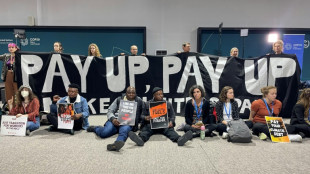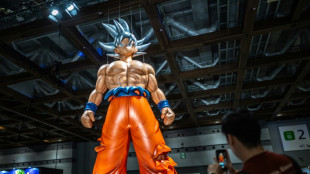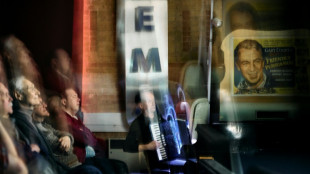
-
 Uganda opposition figure Besigye appears in military court
Uganda opposition figure Besigye appears in military court
-
General strike in Greece against cost of living

-
 UN nuclear chief welcomes Iran's 'concrete step' on uranium stockpile
UN nuclear chief welcomes Iran's 'concrete step' on uranium stockpile
-
Floods to shave 0.2 percentage points off Spain's growth

-
 Argentina's Contepomi makes one change for France Test
Argentina's Contepomi makes one change for France Test
-
'Steep climb' ahead as clock ticks on stalled climate talks

-
 Gatland changes four for Wales clash with South Africa
Gatland changes four for Wales clash with South Africa
-
'Sport will have the last word' as WRC title goes down to the wire in Japan

-
 Western powers move to censure Iran at UN nuclear meet
Western powers move to censure Iran at UN nuclear meet
-
US envoy presses Israel-Hezbollah truce bid in Lebanon visit

-
 'No controversy' around Alldritt exclusion for Argentina Test
'No controversy' around Alldritt exclusion for Argentina Test
-
Stock markets gain, dollar higher before Nvidia earnings

-
 New WHO financing mechanism put to the test
New WHO financing mechanism put to the test
-
Besigye kidnapping: Uganda president's doctor turned rival

-
 Star K-pop producer of NewJeans quits after legal spat with BTS agency
Star K-pop producer of NewJeans quits after legal spat with BTS agency
-
'Eternal' Nadal leaves legacy as he retires from tennis

-
 Vieira takes over at struggling Gerona
Vieira takes over at struggling Gerona
-
Australia's Kerevi banned for Morgan tackle

-
 Bellamy defies 'lunatic' reputation to inspire Wales revival
Bellamy defies 'lunatic' reputation to inspire Wales revival
-
Kremlin says US 'doing everything' to prolong 'war' in Ukraine

-
 Magritte painting nets auction record of $121 million
Magritte painting nets auction record of $121 million
-
Markets fluctuate as traders weigh geopolitical tensions

-
 N. Korea's latest weapon? Bombarding South with noise
N. Korea's latest weapon? Bombarding South with noise
-
'Kidnapped' Uganda opposition figure Besigye to appear at military court: lawyer

-
 Asian markets fluctuate as traders weigh geopolitical tensions
Asian markets fluctuate as traders weigh geopolitical tensions
-
'An inauspicious day': the landmines ruining Myanmar lives

-
 UN to vote again on Gaza ceasefire, US plans unclear
UN to vote again on Gaza ceasefire, US plans unclear
-
Japan's manga powerhouse 'Dragon Ball' turns 40

-
 Japanese, Koreans bottom of global love life survey
Japanese, Koreans bottom of global love life survey
-
Son blames 'mistakes' after South Korea held by Palestine in qualifier

-
 Japan ramps up tech ambitions with $65 bn for AI, chips
Japan ramps up tech ambitions with $65 bn for AI, chips
-
Lights, action, melodrama! Silent films get new reel at London haven

-
 Myanmar led world in landmine victims in 2023: monitor
Myanmar led world in landmine victims in 2023: monitor
-
ICC to sentence Timbuktu war criminal

-
 Ugandan opposition figure Besigye 'kidnapped', says wife
Ugandan opposition figure Besigye 'kidnapped', says wife
-
Australia's Jason Day eyes more major glory after resurgence

-
 Machu Picchu security boosted after visitors spread human ashes
Machu Picchu security boosted after visitors spread human ashes
-
Popovic hails Australia character in 'crazy' World Cup qualifier

-
 Taliban govt clearing 'un-Islamic' books from Afghanistan shelves
Taliban govt clearing 'un-Islamic' books from Afghanistan shelves
-
Argentina beat Peru as Uruguay hold Brazil

-
 Asian markets struggle as traders weigh geopolitical tensions
Asian markets struggle as traders weigh geopolitical tensions
-
Tatum stars as Celtics end Cavaliers unbeaten start

-
 Hurting India under pressure in blockbuster five-Test Australia series
Hurting India under pressure in blockbuster five-Test Australia series
-
'They killed her dream': Israel strike leaves woman footballer in coma

-
 Iraq holds its first census in nearly 40 years
Iraq holds its first census in nearly 40 years
-
Iraqis face tough homecoming a decade after IS rampage

-
 Russian net tightens around last civilians left in eastern Ukraine
Russian net tightens around last civilians left in eastern Ukraine
-
Olympic champion Tebogo aims to inspire next generation of African athletes

-
 Valencia on target as ten-man Ecuador upset Colombia
Valencia on target as ten-man Ecuador upset Colombia
-
'Rust' to premiere three years after on-set shooting


El Shafee Elsheikh, from London to Syria to IS 'Beatle'
El Shafee Elsheikh, convicted on all charges in the deaths of four American hostages, went to Syria a decade ago with two childhood friends from London to wage jihad against the regime of President Bashar al-Assad.
Elsheikh, Alexanda Amon Kotey and Mohamed Emwazi ended up joining the Islamic State and forming a notorious kidnap-and-murder cell known as the "Beatles."
"They grew up together, radicalized together, fought as high-ranking IS fighters together and tortured and terrorized hostages together," prosecutor Raj Parekh said in his closing arguments at Elsheikh's trial.
Elsheikh was born in Sudan in 1988 but moved to Britain as a child. His father left the family when he was seven years old, according to the non-profit Counter Extremism Project (CEP).
Elsheikh studied mechanical engineering at Acton College in London, according to CEP, and was stabbed in a fight with a gang member when he was 19.
He married an Ethiopian woman in Canada when he was 21, but was not allowed to bring her to Britain, allegedly deepening his anger at the British government.
Elsheikh became increasingly radicalized and took part in a "Muslims Against Crusades" demonstration outside the US Embassy in London on September 11, 2011, according to the US indictment.
He traveled to Syria in 2012 to "wage violent jihad on behalf of radical Islamic groups," first joining an Al-Qaeda affiliate there and then IS, US prosecutors said.
Between 2012 and 2015, Elsheikh and the other "Beatles" seized more than two dozen American, European, Japanese and Russian hostages -- mostly journalists and relief workers.
Ten former European and Syrian hostages testified at Elsheikh's trial accusing the "Beatles" of months of brutal treatment including beatings, electric shocks, waterboarding and mock executions.
- 'Terrifying' -
A French journalist said that he and other hostages were forced by their captors to sing a depraved parody of the Eagles song "Hotel California" called "Hotel Osama."
"It was terrifying for us, a joke for them," Nicolas Henin told the jury.
"George was into boxing. John kicked a lot. Ringo talked a lot about how he liked wrestling, putting people in headlocks," said Federico Motka, an Italian relief worker using the nicknames the hostages gave to their captors.
Prosecutors said Elsheikh was the "Beatle" the hostages called "Ringo."
Elsheikh's defense attorneys argued that the government had failed to prove he was one of the "Beatles" but the 12-person jury disagreed, convicting him of all charges.
Elsheikh, who was dressed in beige or yellow pants with light and dark blue shirts for his trial, declined the opportunity to testify in court but it was his own words that helped convict him.
Prosecutors repeatedly played excerpts for the jury of interviews Elsheikh gave to media outlets after his capture by Kurdish forces in Syria in January 2018.
He acknowledged interacting with some of the hostages but said he only collected information about them such as email addresses so the captors could be in touch with their families to discuss ransoms.
Elsheikh, who Britain stripped of his nationality, denied ever torturing captives but acknowledged he did not always show them "compassion."
Elsheikh was convicted of hostage-taking, conspiracy to murder US citizens -- journalists James Foley and Steven Sotloff and relief workers Peter Kassig and Kayla Mueller -- and supporting a foreign terrorist organization.
Kotey, 38, pleaded guilty in September 2021 to similar charges and is facing life in prison.
Emwazi, the IS executioner known as "Jihadi John" who beheaded Foley, Sotloff and Kassig, was killed by a US drone in Syria in November 2015.
W.Nelson--AT
